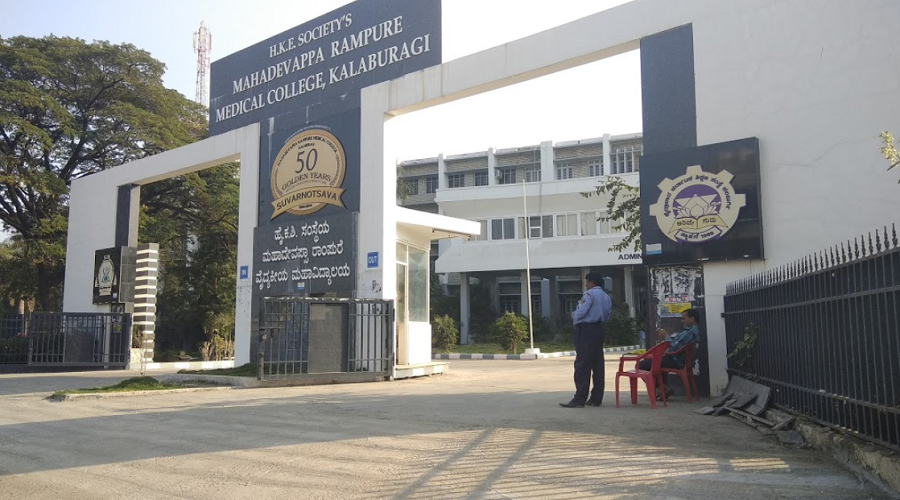
The Government of Karnataka had decided to establish a Medical College at Bellary instead of Gulbarga. Hyderabad Karnataka Education Society under the leadership of Sri Mahadevappa Rampure started a Medical College in Private sector in 1963. Sri S. Nijalingappa, the then Chief Minister, Govt. of Karnataka, Sri. Veerendra Patil and Dr. D. C. Pavate helped in establishing the Medical college.
Medical College was started in 1963 with mission to bring out quality doctors by imparting quality education to meet the present and changing expectation of the people and improving the health status of the people of this region by offering health care and providing optimum training facilities for Medical students.
In 1973, Sri. Mahadevappa Rampure, the architect & founder of the Medical College left to heavenly abode and to salute his vision, dynamism and hard work in establishing this College, it was named after him as “Mahadevappa Rampure Medical College”.
Initially clinical training was given in the Govt. District Hospital (Present District Health Office) on the Main road, which was having a very small space. Looking at the needs of the college & due to keen interest shown by the then PWD minister Sri. Veerendra Patil, Government started the construction of a 850 bedded hospital on Sedam road.
The hospital was ready in January 1967. The clinical training was shifted to the present District General Hospital.
The College got recognition from the Medical Council of India in 1972. It was the second private medical college in the Country after KMC, Manipal to get this recognition. College also got the recognition from the British Medical Council.
The College achieved a new landmark in 1979 with the opening of the post-graduate courses in 8 subjects. The Blood Bank was established in 1980. The College was affiliated to the Gulbarga University till the year 1996 & thereafter Rajiv Gandhi University of Health Sciences, Bangalore. The College got 10 more new Post-Graduate courses during the eighties. The College started Certificate courses in Laboratory technology, radiographer and optician & refractionist and also B.Sc. Laboratory Technology.
The College runs the Post Graduate Courses in Preclinical Subjects: Anatomy, Physiology and Biochemistry. Paraclinical Subjects: Pathology, Pharmacology, Microbiology, Forensic Medicine and Community Medicine. And Clinical Subjects: Medicine, Paediatrics, Dermatology, Surgery, Orthopedics, ENT, Ophthalmology, Radiodiagnosis, Anaesthesia, Obstetrics and Gynecology. The College got recognition to all its post-graduate courses by the Medical Council of India. The courses have been started in the subject of Anatomy, Physiology, Biochemistry and Microbiology under the RGUHS in 2008.
The intake of undergraduate students increased from 100 to 150 per year and these increased admissions were also recognized by the Medical Council of India in 2008. The intake of Post Graduate admissions increased in the Department of Medicine from 08 to 10 per year, in Surgery from 06 to 08 per year and in Orthopaedics from 01 to 03 per year during the year 2005-06.
To improve the health status of the people of this region by offering quality health care and to provide optimum training facilities for Medical students it was decided to start its own hospital for teaching purpose, the land for which was selected near to the college on Sedam Road. Basaveshwara Hospital was given was a silver jubilee gift to the college in 1989. Its foundation stone was laid by Sri R Venkataram, the then Vice President of India in 1983.
It is built as super specialty hospital and was inaugurated by late Sri Rajiv Gandhi, the then Prime Minister of India
Sangmeshwara hospital was added in nineties to the college. The Medical Council insisted that the College must have its own hospital for teaching purpose. Accordingly bed strength of Basaveshwar Hospital was increased to 765 and the Government General Hospital used for teaching purposes from the beginning of the College was discontinued from 2005. Then onwards all the clinical teaching activity is being carried in Basaveshwar and Sangameshwar Hospitals.
The College developed an Urban Family Welfare Centre at Rajapur and constructed residential accommodation at Hebbal Community Health Center.
Currently the college offers the basic undergraduate degree of MBBS and postgraduate degree and diploma degree in 18 subjects. There are 250 well trained & experienced staff.
M.R. Medical College is a four storyed building covering 120,000 square feet area and houses various pre and para clinical departments and also department of Medical Education. Emphasis in all the departments is on applied and Clinical aspects of subjects and all Departments of Anatomy, Physiology, Biochemistry, Pathology, Microbiology, Pharmacology, Forensic Medicine are geared to provide hospital services besides teaching and research. Each department is well equipped with modern equipments.
The rear section of the college has been beautified by converting it into a garden with a fountain in the centre. It serves as a pleasing venue for delegates who come to attend various conferences hosted by the College.
The College has fully operational sports department. There is indoor Sport Complex with wooden Badminton court, TT, Chess, Carrom etc. The students participate in various intercollegiate events organized by the Colleges and University.


